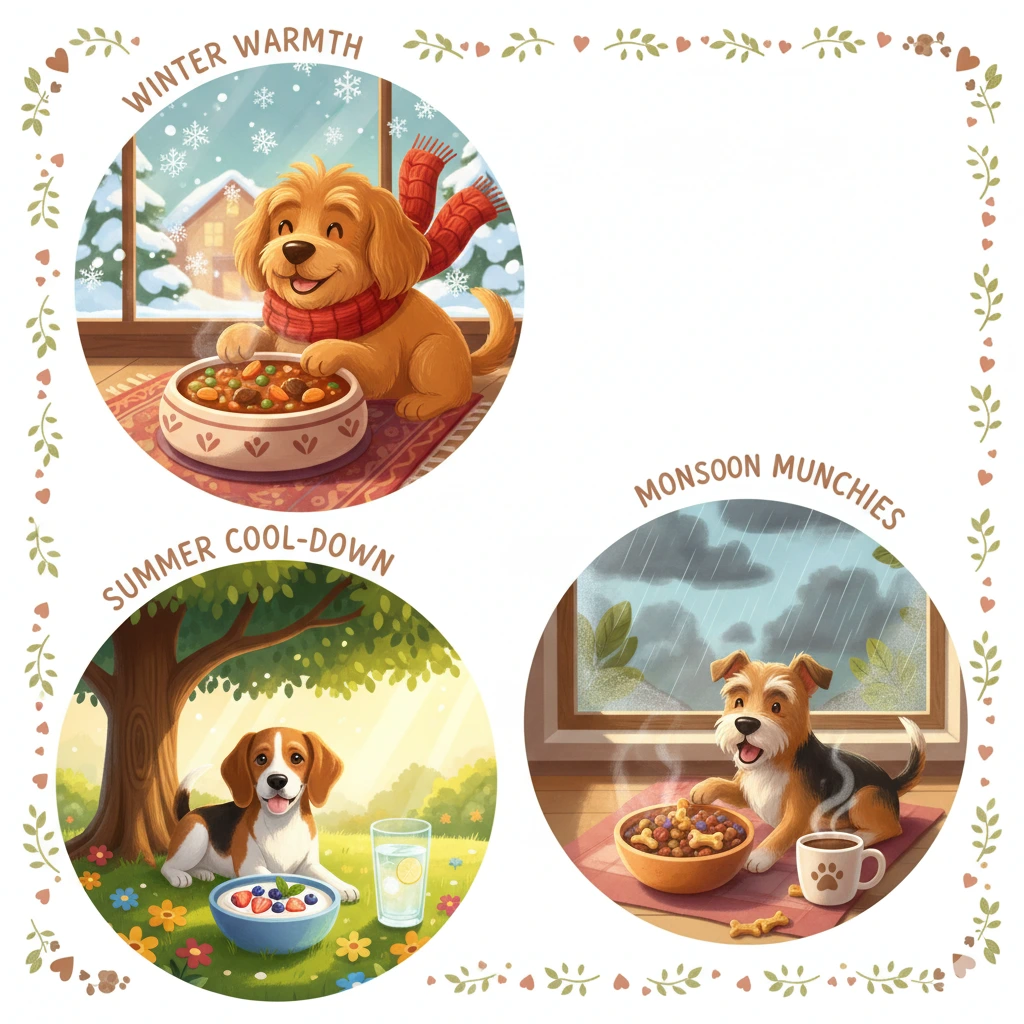Just like humans, dogs have different nutritional needs depending on the season. Temperature changes affect their metabolism, energy levels, hydration, and even digestion. As a responsible pet parent, adapting your dog’s diet to the weather isn’t just about comfort—it’s essential for their overall health and immunity. Here’s how you can tailor your dog’s meals across winter, summer, and monsoon to keep them healthy, happy, and thriving all year long.
Understanding Seasonal Nutrition for Dogs
Dogs’ bodies respond differently to each season. During winter, they burn more calories to stay warm. In summer, they lose fluids and need hydrating foods. And in the monsoon, their immunity can dip, making them prone to infections. By adjusting their diet, you can support their natural defenses and maintain optimal health through every climate shift.
Winter: Warm, Energy-Boosting Nutrition
When the temperature drops, dogs expend more energy maintaining body heat. Their appetite often increases, and their digestion slows slightly due to reduced physical activity. This is the time to provide warming, nutrient-rich meals that supply both calories and comfort.
What to Feed in Winter
- Protein-Rich Foods: Include meats like chicken, lamb, or fish to maintain muscle mass and provide sustained energy.
- Healthy Fats: Add small amounts of ghee, olive oil, or fish oil to meals. These improve coat health and act as natural energy boosters.
- Warm Cooked Meals: Serve gently cooked food instead of cold kibble. Soups, broths, and stews with veggies are great winter comfort meals.
- Complex Carbohydrates: Sweet potatoes, oats, and brown rice provide slow-releasing energy to keep your dog warm and active.
- Herbal Additions: A pinch of turmeric or a little ginger can help improve digestion and immunity during cold months.
Winter Feeding Tips
Make sure water bowls don’t freeze or become too cold. Warm water encourages drinking. Also, avoid overfeeding—dogs need more energy, not excess weight. A short post-meal walk helps digestion and keeps your pet warm.
Summer: Cooling and Hydrating Foods
Hot weather can make dogs lethargic and prone to dehydration. Appetite often decreases, and heat can cause digestive upsets if diets aren’t adjusted. Summer meals should be lighter, water-rich, and cooling in nature.
What to Feed in Summer
- Lean Proteins: Chicken, turkey, eggs, and fish are easy to digest and prevent heat-related sluggishness.
- Hydrating Fruits: Watermelon, cucumber, and apples (in moderation) help maintain hydration levels. Always remove seeds.
- Curd or Yogurt: A small spoon of unsweetened curd keeps your dog’s gut cool and supports healthy digestion.
- Vegetables: Lightly steamed carrots, spinach, and pumpkin provide vitamins without weighing your dog down.
- Coconut Water: An occasional treat that replenishes electrolytes naturally.
Summer Feeding Tips
Feed smaller, more frequent meals instead of large ones. Ensure your dog always has access to cool, fresh water. Avoid red meats and oily foods that generate excess body heat. Frozen treats made from fruits or yogurt can help your pet beat the heat safely.
Monsoon: Immunity-Boosting and Gut-Friendly Foods
The monsoon season brings high humidity, muddy walks, and increased exposure to infections. Dogs can experience reduced immunity, digestive issues, and skin allergies. Nutrition during this season should focus on strengthening the immune system and supporting gut health.
What to Feed in Monsoon
- Boiled and Cooked Food: Raw food can easily harbor bacteria in humid weather. Stick to freshly cooked, warm meals.
- Fiber-Rich Vegetables: Pumpkin, beetroot, and green beans help maintain healthy digestion.
- Probiotics: Add curd or vet-approved probiotic supplements to boost gut health.
- Immunity-Boosting Ingredients: Turmeric, amla powder (in small amounts), and omega-3 fatty acids from fish oil help strengthen defenses.
- Avoid Street Water and Spoiled Food: Always check your dog’s food and water bowls for contamination or insects during monsoon humidity.
Monsoon Feeding Tips
Keep mealtime areas clean and dry. Bathe and dry your dog thoroughly to prevent fungal infections. If your dog becomes picky or shows signs of tummy upset, switch temporarily to bland, easily digestible food like rice and boiled chicken until they recover.
Adjusting Feeding Patterns with the Weather
1. Monitor Appetite Changes
Dogs’ appetites fluctuate naturally with temperature. Observe your pet’s eating behavior and adjust portion sizes accordingly. Don’t force-feed if your dog skips a meal on a hot day, but do ensure hydration.
2. Keep a Consistent Feeding Schedule
Irregular meal times can upset digestion. Feed at the same times daily to maintain metabolism balance, regardless of the season.
3. Transition Gradually Between Seasons
Avoid abrupt changes in diet when the weather shifts. Gradually introduce new ingredients over a week to help your dog’s gut adjust.
4. Stay in Touch with Your Vet
Seasonal diet changes should complement your dog’s age, breed, and health condition. Regular vet checkups help fine-tune nutrition and identify deficiencies early.
Foods to Avoid Year-Round
Some foods are unsafe in any season:
- Chocolate, grapes, raisins, onions, and garlic.
- Excess salt or sugary treats.
- Leftovers from the human table, especially spicy or oily food.
- Dairy-heavy products if your dog is lactose intolerant.
Stick to natural, wholesome ingredients and avoid over-supplementing unless prescribed by your vet.
Homemade vs. Packaged Meals: Seasonal Balance
While premium packaged dog food offers convenience and balanced nutrition, seasonal homemade meals can add variety and freshness. The best approach is to combine both—use high-quality kibble as a base and complement it with fresh, seasonal ingredients for added flavor and nutrition. Always maintain portion control to prevent obesity.
The Role of Hydration Across Seasons
Water is the one nutrient that remains constant across all seasons. Dogs can quickly get dehydrated, especially in summer and after long walks. In winter, they might drink less, so encourage hydration through soups or wet food. In the monsoon, ensure water bowls are clean to prevent infections. Good hydration supports digestion, detoxification, and temperature regulation.
Conclusion: A Year-Round Commitment to Wellness
Feeding your dog according to the season isn’t just about changing meals—it’s about responding to nature’s rhythm and your pet’s needs. Winter calls for warmth and energy, summer demands hydration and lightness, and monsoon requires immunity and gut care.
Every adjustment you make—whether it’s adding a spoon of ghee in winter, serving cold fruits in summer, or offering probiotics in monsoon—contributes to your dog’s long-term vitality.
When you nourish your pet in tune with the seasons, you’re not just feeding them—you’re caring for their body, mind, and happiness. After all, a healthy dog is a joyful companion through every change of weather.



